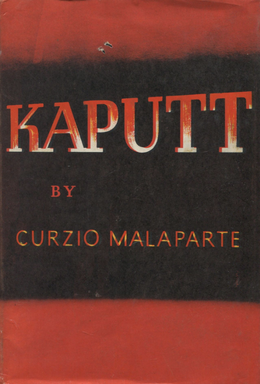Related Research Articles

Italo Calvino was an Italian writer and journalist. His best-known works include the Our Ancestors trilogy (1952–1959), the Cosmicomics collection of short stories (1965), and the novels Invisible Cities (1972) and If on a winter's night a traveler (1979).

Walter Scott Murch is an American film editor, director, writer and sound designer. His work includes THX 1138, Apocalypse Now, The Godfather I, II, and III, American Graffiti, The Conversation, Ghost and The English Patient, with three Academy Award wins.

Curzio Malaparte was an Italian writer, filmmaker, war correspondent and diplomat. Malaparte is best known outside Italy due to his works Kaputt (1944) and The Skin (1949). The former is a semi-fictionalised account of the Eastern Front during the Second World War and the latter is an account focusing on morality in the immediate post-war period of Naples.

Alberto Pincherle, known by his pseudonym Alberto Moravia, was an Italian novelist and journalist. His novels explored matters of modern sexuality, social alienation and existentialism. Moravia is best known for his debut novel Gli indifferenti and for the anti-fascist novel Il conformista, the basis for the film The Conformist (1970) directed by Bernardo Bertolucci. Other novels of his adapted for the cinema are Agostino, filmed with the same title by Mauro Bolognini in 1962; Il disprezzo, filmed by Jean-Luc Godard as Le Mépris ; La noia (Boredom), filmed with that title by Damiano Damiani in 1963 and released in the US as The Empty Canvas in 1964 and La ciociara, filmed by Vittorio De Sica as Two Women (1960). Cédric Kahn's L'Ennui (1998) is another version of La noia.

Casa Malaparte is a house on Punta Massullo, on the eastern side of the isle of Capri, Italy. It is considered to be one of the best examples of Italian modern and contemporary architecture.

Edda Ciano, Countess of Cortellazzo and Buccari was the daughter of Benito Mussolini, fascist Prime Minister of Italy from 1922 to 1943. Her husband, the fascist propagandist and Foreign Minister Galeazzo Ciano, was executed in January 1944 for his role in Mussolini's ouster. She strongly denied her involvement in the National Fascist Party regime after her father's execution by the Italian partisans in April 1945.

An exemplum is a moral anecdote, brief or extended, real or fictitious, used to illustrate a point. The word is also used to express an action performed by another and used as an example or model.

The Penelopiad is a novella by Canadian author Margaret Atwood. It was published in 2005 as part of the first set of books in the Canongate Myth Series where contemporary authors rewrite ancient myths. In The Penelopiad, Penelope reminisces on the events of the Odyssey, life in Hades, Odysseus, Helen of Troy, and her relationships with her parents. A Greek chorus of the twelve maids, who Odysseus believed were disloyal and whom Telemachus hanged, interrupt Penelope's narrative to express their view on events. The maids' interludes use a new genre each time, including a jump-rope rhyme, a lament, an idyll, a ballad, a lecture, a court trial and several types of songs.

Ennio Flaiano was an Italian screenwriter, playwright, novelist, journalist, and drama critic. Best known for his work with Federico Fellini, Flaiano co-wrote ten screenplays with the Italian director, including La Strada (1954), La Dolce Vita (1960), and 8½ (1963).
Autofiction is, in literary criticism, a form of fictionalized autobiography.
A Woman Like Me may refer to:
"900",Cahiers d'Italie et d'Europe was an Italian magazine published for the first time in November 1926, directed by Massimo Bontempelli with Curzio Malaparte as co-director. Beginning as an internationalist publication, after some numbers it dramatically changed its editorial line, rallying to the nationalist, strapaesani line of the magazine Il Selvaggio.
The John Florio Prize for Italian translation is awarded by the Society of Authors, with the co-sponsorship of the Italian Cultural Institute and Arts Council England. Named after the Tudor Anglo-Italian writer-translator John Florio, the prize was established in 1963. As of 1980 it is awarded biannually for the best English translation of a full-length work of literary merit and general interest from Italian.

Robin Monotti Graziadei is an Italian architect, film producer, biourbanist and water fountain designer based in London. He was the managing partner of Robin Monotti Architects, a firm that he founded in 2007. In 2010, Monotti won the RIBA and Royal Parks Foundation's International Drinking Fountain Design Competition with his Watering Holes fountain design. In 2016 Robin co-founded the film production company Luminous Arts Productions, which co-produced the drama feature film on the history and philosophy of medicine The Book of Vision executively produced by Terrence Malick.

Kaputt is a 1944 autobiographical novel by the Italian writer Curzio Malaparte.
The Skin is a 1949 autobiographical novel by the Italian writer Curzio Malaparte.
Those Cursed Tuscans is a 1956 book by the Italian writer Curzio Malaparte.
The Volga Rises in Europe is a book of World War II journalism by the Italian writer Curzio Malaparte.
Jenny McPhee is an American novelist and translator. A 2020 Guggenheim Fellow, she has worked as a translator of Italian literature to English and wrote the novels The Center of Things (2001), No Ordinary Matter (2004), and A Man of No Moon (2007).
Malaparte. Morte come me is a 2016 novel by the Italian writer duo Monaldi & Sorti. It is a murder mystery set on Capri in 1939 with the writer Curzio Malaparte as main character.
References
- ↑ Malaparte, Curzio (2007). "Contents". Woman Like Me. Translated by Graziadei, Robin Monotti. Leicester: Troubador Publishing. ISBN 1-905237-84-7.
- ↑ Healey, Robin (2019). Italian Literature since 1900 in English Translation: An Annotated Bibliography: 1929–2016. Toronto Buffalo London: University of Toronto Press. p. 733. ISBN 978-1-4875-0292-8.
- 1 2 3 Hope, William (2000). Curzio Malaparte: The Narrative Contract Strained. Market Harborough: Troubador. pp. 66–67, 78. ISBN 1-899293-221.